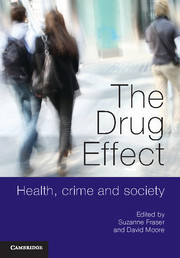Book contents
- Frontmatter
- Contents
- List of contributors
- Acknowledgements
- Introduction
- Part 1 Drug use as social and cultural practice
- 1 The social life of smokes
- 2 Party animals
- 3 Pleasure and pain
- 4 The ontological politics of knowledge production
- Part 2 Drugs, health and the medicalisation of addiction
- Part 3 Drugs, crime and the law
- Index
- References
1 - The social life of smokes
Processes of exchange in a heroin marketplace
from Part 1 - Drug use as social and cultural practice
- Frontmatter
- Contents
- List of contributors
- Acknowledgements
- Introduction
- Part 1 Drug use as social and cultural practice
- 1 The social life of smokes
- 2 Party animals
- 3 Pleasure and pain
- 4 The ontological politics of knowledge production
- Part 2 Drugs, health and the medicalisation of addiction
- Part 3 Drugs, crime and the law
- Index
- References
Summary
Exchange is interesting, because it is the chief means by which useful things move from one person to another; because it is an important way in which people create and maintain social hierarchy; because it is a richly symbolic activity – all exchanges have got social meaning.
Davis, Exchange, p. 1In this chapter, I focus on exchange in order to argue that illicit drug marketplaces are produced and reproduced through complex and dynamic social processes and relations. This understanding contrasts with dominant conceptions of drug (and other) markets that view them as driven by the mechanism of supply and demand, that largely ignore their constituent social relations and that tend to reify the ‘market’ as an object to be measured rather than a process to be understood. The chapter also challenges dominant and stigmatising constructions of heroin users and sellers (hereafter ‘dealers’) as denigrated, abject ‘others’, revealing that, in their everyday lives, they engage in similar practices and struggle with many of the same challenges as do we all.
- Type
- Chapter
- Information
- The Drug EffectHealth, Crime and Society, pp. 19 - 34Publisher: Cambridge University PressPrint publication year: 2011
References
- 4
- Cited by



